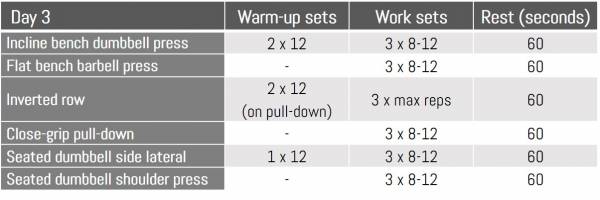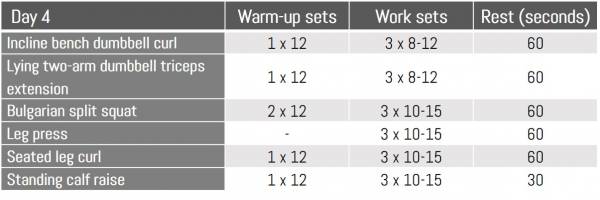Most programs are written to accommodate the everyman schedule, which means an afternoon or evening workout. This is especially true when nutrition is mentioned. But as the ranks of gym-goers swell in the afternoons and evenings, the number of lifters who choose to get their workouts done first thing in the morning is growing. There’s a lot to be said for getting a solid start to the day, while avoiding crowded gyms and crowded roadways. It’s also a great way to open up the evenings to spend more time with family and friends, or to use that post-work time for other pursuits.
Then there are those of us who have no choice. Work, family, or other obligations require us to rise early and train or not go at all. Below is a plan of attack designed specifically for the morning lifter, complete with pre-workout rituals and pre- and post-workout nutrition suggestions to get the most out of being an early riser.
Rules to Wake Up To
Morning workouts are vastly different than afternoon sessions. Your body temperature will be lower, you’ll have less food in your system to fuel your training, and your body has (hopefully) been holding still for the past eight hours, meaning a possibly stiff spine and a general lack of blood flow to your extremities. With those issues and more in mind, here are a few ground rules.
Have a Serious Warm Up
A quick walk on the treadmill won’t do it for the morning trainer. You need some serious blood flow and your muscles need to be primed and ready for the work to come. You wake up cold, so you’ll need an extensive warm-up routine to include a general phase (walk, bike, or jog), dynamic phase (jumping jacks, burpees, or jump squats), and a specific warm-up for that particular day (progressive sets of squats for lower body, for example).
Despite your morning fog, do everything you can to avoid haphazardly going through the motions of your warm up. Sleep walking through your progressive sets is not only ineffective, it’s also dangerous. Many injuries in the gym are from the lack of attention to warming up, which includes not focusing on the stretch and contraction, not following proper movement paths, and rushing through sets. Treat every set, even each warm up set, as an important component of your workout.
Wake Up Your Whole Core
Traditionally, if you were to train in the evening, your core is already somewhat awake. But morning lifters need some extra wake-up mojo. Forcing blood to the core and activating this vital central strength area of the body will help raise body temperature, and help your spine become ready for battle. This can be easily combined with your dynamic warm up routine by including crunches, leg lifts, and hyperextensions.
Start Light and Fast
Lifting heavy is tough enough, but pitting yourself against the same loads in the morning that you are used to doing in the the evening can feel like you hit a brick wall. If you’re new to morning training, err on the side of slightly lighter loads and higher reps to start. The higher rep range will help you adapt and coax your body into this new time of training. After several weeks, slowly add weight and you’ll be training heavy again in no time.
Take Time to Adapt
Lastly, you’ll want to give yourself time to adapt to early morning training. Jumping in head first will only leave you burnt out before you really start. Give it time, do fewer sets at lighter weight, or generally shorter workouts in the beginning. Just like everything else in the world of fitness, you will adapt over time. Be patient.
The Early Bird Training Program
Start each day of the program with the dynamic warm up listed below. Then, perform each workout shown below once per week, such as Monday, Tuesday, Thursday, and Friday.
Dynamic Warm Up:
Perform 2-4 rounds of 10 reps each. Rest one minute between each round.



What to Eat While the Family Sleeps
Next, let’s take a look at your new morning nutrition plan. The goal here is to keep things light and purposeful. You don’t want a huge breakfast that will leave you bogged down with a lump of food in your stomach. But you still want to make sure that you eat a pre- and post-training meal, so that you have some fuel in your body before you start, and the repair process can begin as soon as you’re done.
Keep all foods before your workout lean and easy to digest. If you can’t eat pre-training, that’s okay; an empty stomach won’t destroy your progress. But do get some water in you, since you’ll be dehydrated from not drinking for eight or more hours.
Morning Meal Suggestions:
Pre-Workout (upon rising)
- 1 scoop quality whey protein
- Small piece of fruit
Post-Workout (immediately after training)
- 1 scoop of whey protein
- 8-12 ounces of sports drink
Breakfast
- ½ to 1 cup of oats mixed with 1 tbsp natural peanut butter, cinnamon, and water
- 3 whole eggs scrambled
- 1 cup Greek yogurt
Think your program needs to be fancy to work? Think again:






